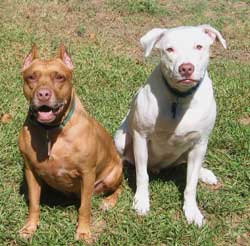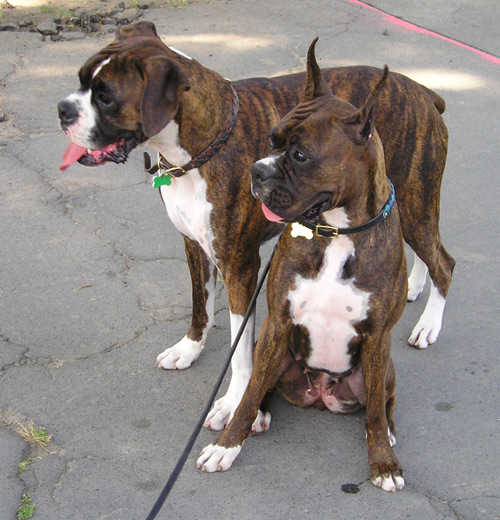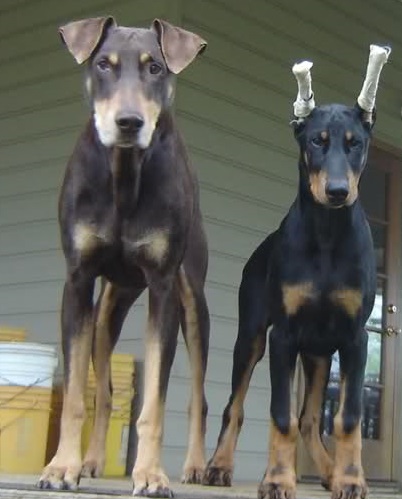Ear Cropping
by Roger Ross DVM
This procedure is also controversial in that many consider it an outdated, unnecessary, and therefore cruel surgery done only to make the pet look traditional. People who make this argument are mostly right, although calling it cruel is probably an overstatement. It's a bigger deal than piercing our ears or other body parts. It's a smaller deal than the binding of feet of upper class Asian women. Like the binding of feet, I predict that ear cropping will someday become a thing of the past.
I personally avoid ear cropping for cosmetic reasons (we often have to crop ears because of injuries or cancers), but not because I think it's a horrid thing to do.
Puppies continue to play and eat within hours of the surgery and both the minor post op pain and irritation is fairly easy to control.
I do go along with the idea that this is an unnecessary surgery and like tonsilectomies will become less and less common.
Another reason I avoid this surgery is because there's a certain amount of luck involved in getting the ears to "stand" perfectly, and no matter how great the surgeon, some ears are going to end up looking "funny" which always leads to the insensitive question of "what fool cropped those ears?"
I do try to discourage ear cropping because I do agree that stopping this tradition is a good idea...but I'd much rather a veterinarian perform the surgery...under anesthesia and sterile conditions, with follow up care and effective pain relief...than have it be done by breeders with a razor and a bottle of alcohol.
However you feel, here's a description of the actual surgery:
Presurgical and preanesthesia exam for general health, and to make sure vaccines and deworming have been done prior to the stress of surgery.
Ear cropping is usually done at 10-12 weeks of age. If you wait too long, the ears are not as likely to stand nicely.
Preanesthesia sedatives, pain medications, and preventive antibiotics
Hair Clipping and surgical prep of the ear flaps
Surgical scrubbing of the Surgeon
Trimming the ear flaps to the desired shape. Some vets use a form to guide their scalpel; I use anatomical landmarks and a steady hand for the job.
Careful suturing of the raw edges to avoid crushing or unnecessary inflammation to the underlying cartilage. Some vets might have a surgical laser available which probably does the job better.
Now that we have a medical laser we use it after suturing the edges to speed healing and greatly reduce pain and inflammation.
That's it except for:
Careful monitoring until recovered
Post op topical and systemic medication and antibiotics to minimize itching, pain, inflammation, and infection until the ear edges are well healed.
Suture removal in about 7 days. (Sutures are usually removed early in the healing process to prevent disfiguration of the cartilage).
Once the ear edges are healed nicely, then we use some combination of forms, glue, and bandages to "train" the ears into the desired position. This is the part that requires a little luck and a patient that tolerates tape and bandages on it's head. Some vets also recommend vitamin C and/or calcium and other minerals in the belief that it helps the cartilage to become stronger and stiffer.
Most dogs tolerate all this well and continue to eat and play and adore their owners. Most heal quickly and without many side effects or problems.
There are lots of web sites out there either condemning or defending ear cropping in dogs. I encourage you to avoid the surgery, but to make up your own mind. Frankly, my average day involves so many seriously sick and injured pets and so many cases of animal suffering due to owner neglect that I've relegated the rightness or wrongness of ear cropping to a low rung on my priority list of battles to fight.
Website Directory
"What To Expect When You Go To The Vet"
if your pet should have a problem with ...
To include Femoral Head Removal, Hip Dysplasia, Anterior Cruciate Ligament Injuries, Panosteitis, Radiographic Demonstrations, Disc Disease, and Bone Surgery
Strokes, Vascular Diseases, Anemias, DVT, DIC, Blood Parasites, Rat Poison, & Bleeding disorders
Cardiology Heart disease in Cats, Cardiac Hypertrophy, Valvular disease, Cardiac Insufficiency, Congestive Heart Failure, Heartworm Disease, and a little history about the milestones in treating heart disease
Cats: general information page and directory of diseases and problems specific to cats including vaccine recommendations, leukemia, feline viral infections, feline upper respiratory disease and cats that just aren't feeling well.
Dermatology: Skin problems including allergies, rashes, bacterial infections, and itching. Hair Loss, Yeast Infections, Hormonal Problems
Heart disease; Cardiac diseases, vascular diseases, stroke, & heartworms
Hormone Diseases: Diabetes, Thyroid Disease, Cushing's Disease or Hypercortisolism, Addison's disease or Hypocortisolism, Pancreatitis, obesity as a disease
Infectious Diseases Colds, Distemper, Parvo, Leptospirosis, Bruceellosis, Panleukopenia, Feline AIDS, Leukemia, Hepatitis, Kennel Cough, Ringworm, Rabies, FIP, Canine Herpes, Toxic Shock Syndrome, & More
Intestinal problems: diarrhea, constipation, torsion, indigestion, and gas. Also pancreatitis, vomiting, esophagitis, colitis, parvo and other types of dysentery
Metabolic Diseases: Diabetes, Thyroid Disease, Cushing's Disease or Hypercortisolism, Addison's disease or Hypocortisolism, Pancreatitis, obesity as a disease
Parasite Problems Fleas, Ticks, Heartworms, Intestinal Worms, Mosquitos, Lice, Mites, and other welfare recipients
Poisons Snakes, Insects, household chemicals, plants, and foods that might poison your pet
Skeletal-Muscular Problems Arthritis, Fractures, ACL, Ligament Injuries, Disc Disease, Pannus, and many other problems of the bones, muscles, tendons, and ligaments
Skin Problems: allergies, rashes, bacterial infections, and itching. Hair Loss, Yeast Infections, Hormonal Problems
Surgery: Spays, Castrations, Testicle Recipes, Soft Tissue Surgery, Hard Tissue Surgery (Bones), C- Sections, Declawing, Tumor Removal and Cancer Surgery
Other Topics on This Site
Zoonotics: Diseases, worms, and parasites people get from pets.
Includes information about Prescription diets used to treat disease, and a discussion about the pet food industry
Includes information about feline and canine heat or estrus, breeding, C-Sections, pyometra or Infected Uterus, dystocia, no milk, mastitis, & brucellosis
Also newborn care, undescended testicles, and alternative to spaying and castration
WildLife Page: Taking care of baby bunnies, squirrels, and birds. A very funny story about beavers, and other misc information
Our Dog Page: a directory of problems of concern in dogs including parvovirus, distemper, canine herpes, and other diseases






